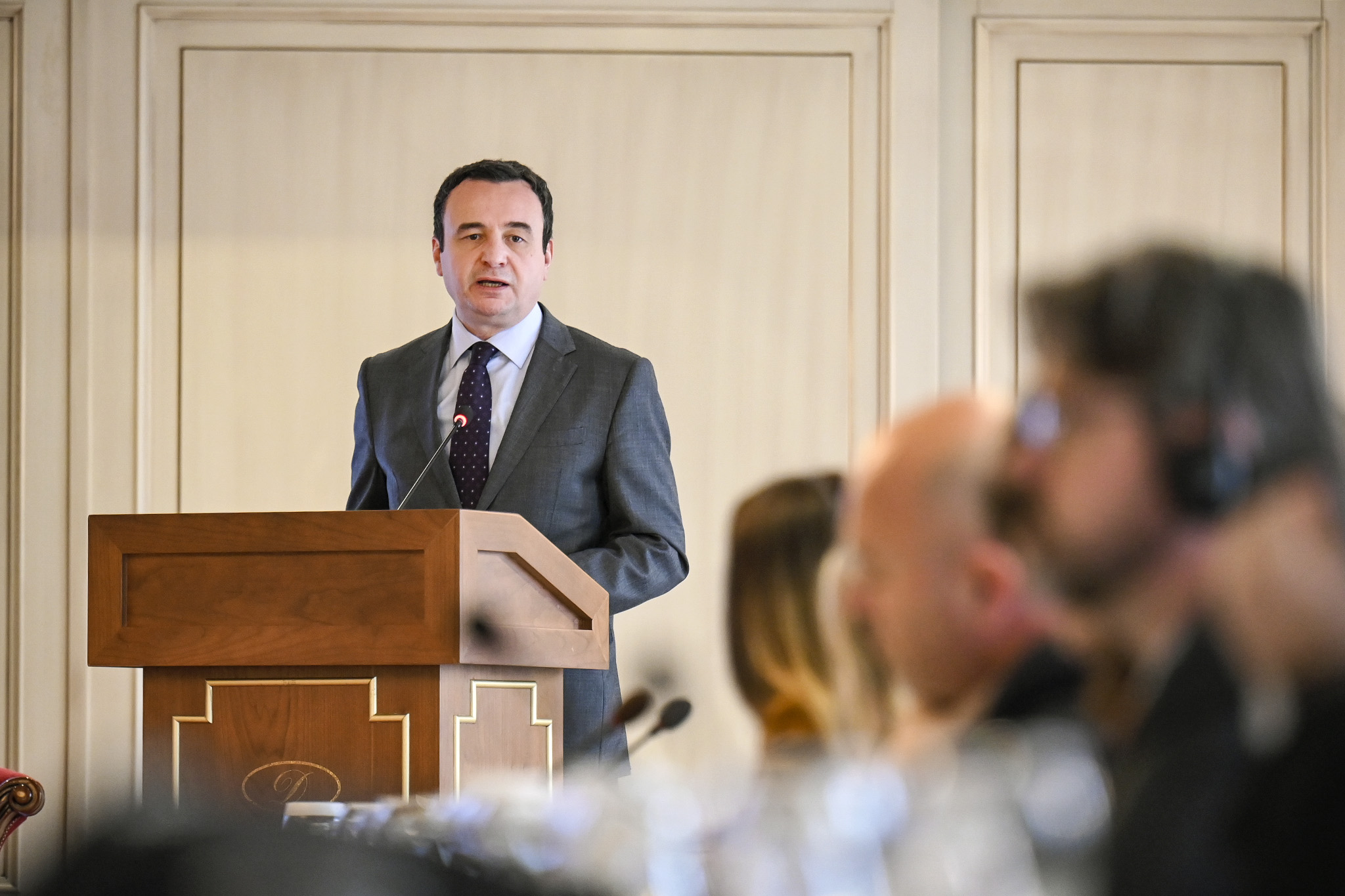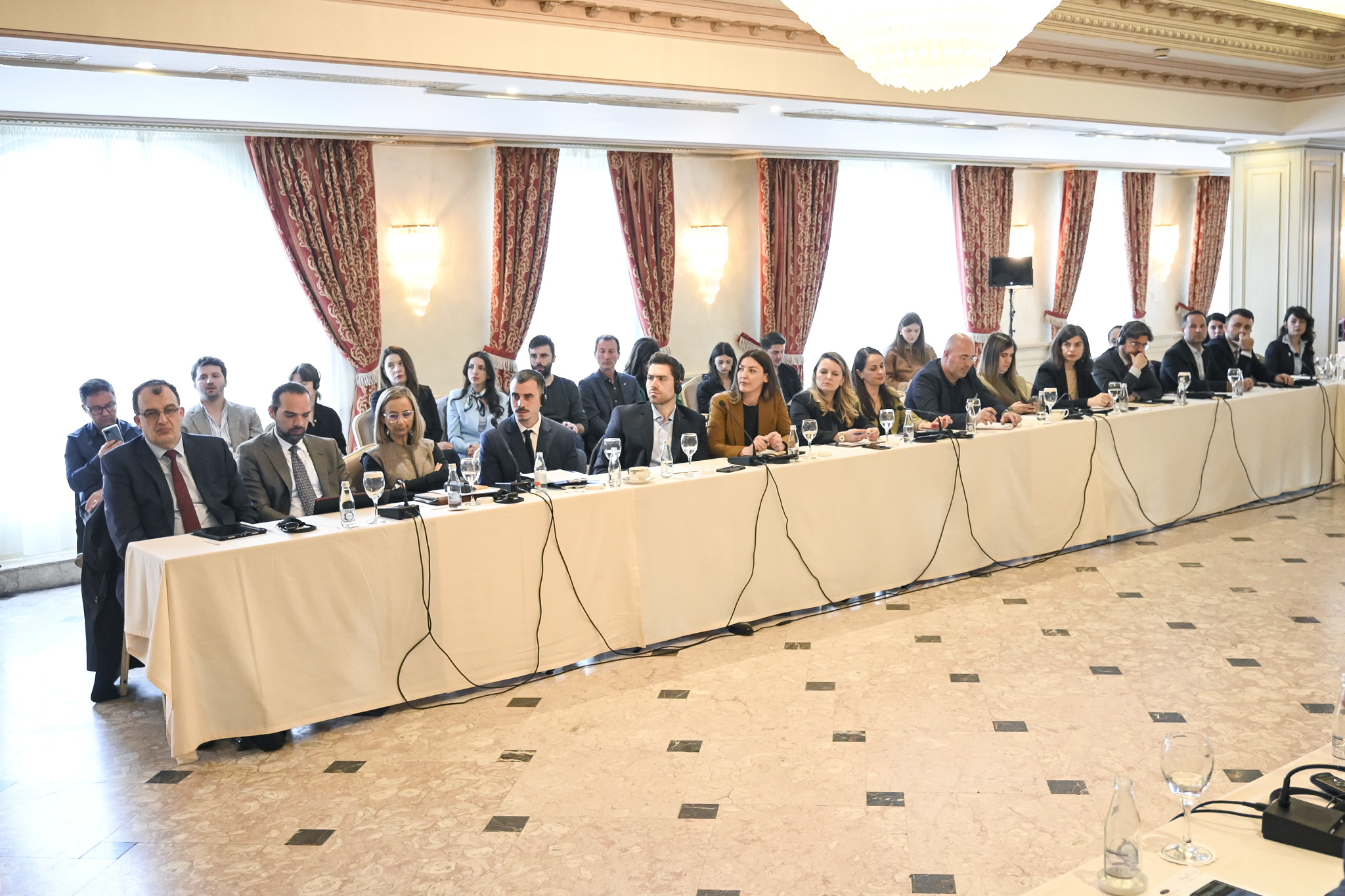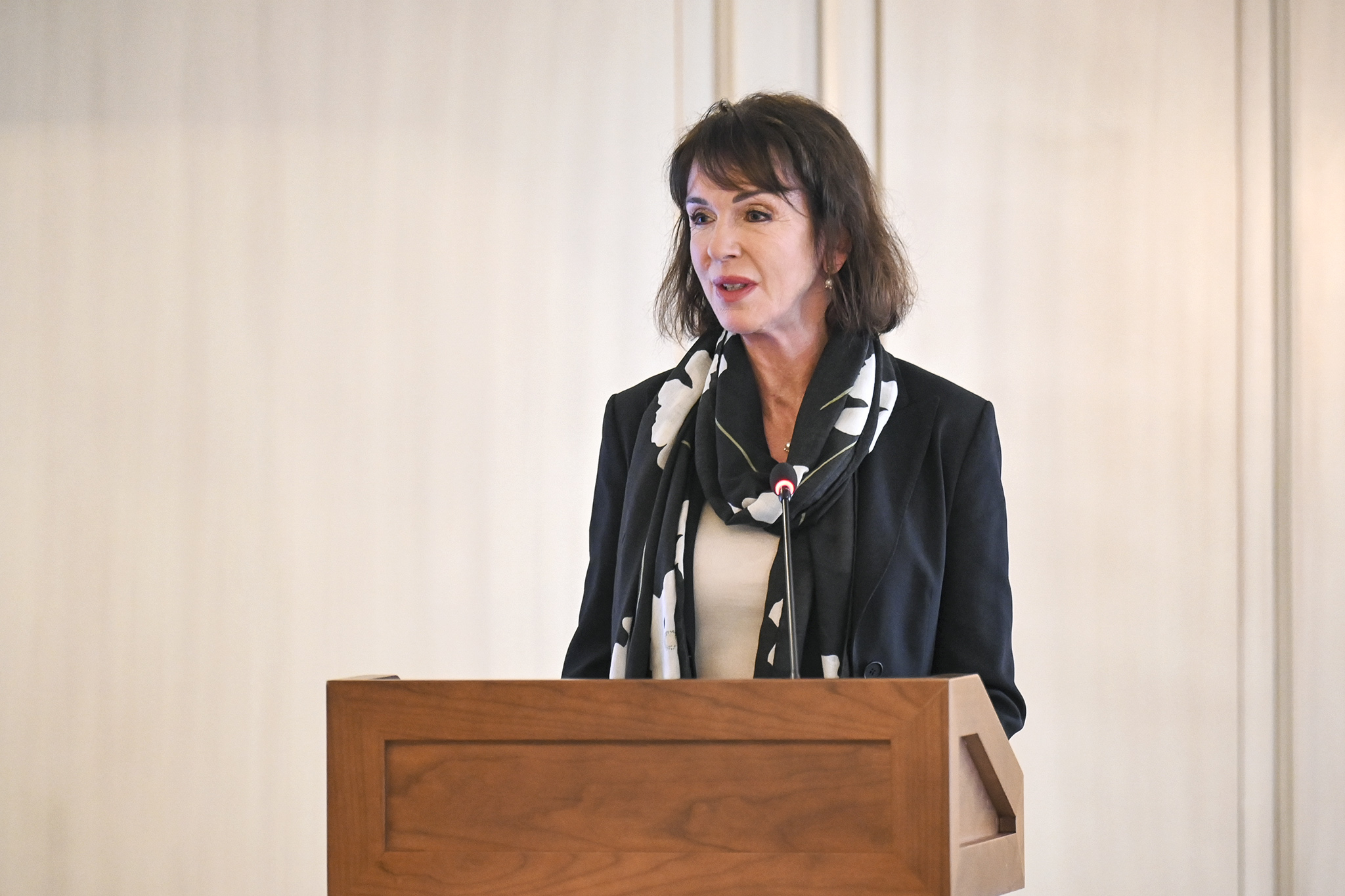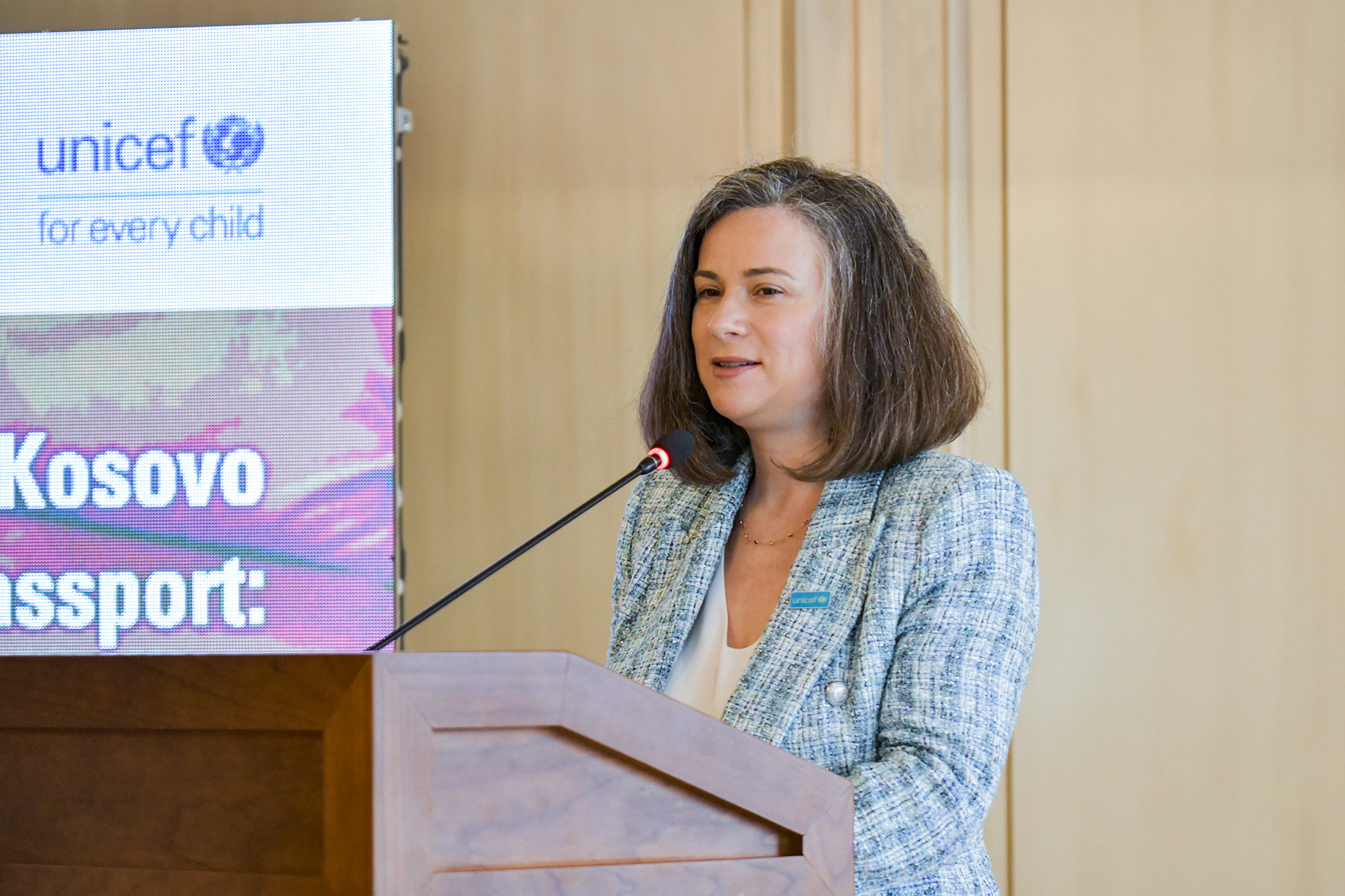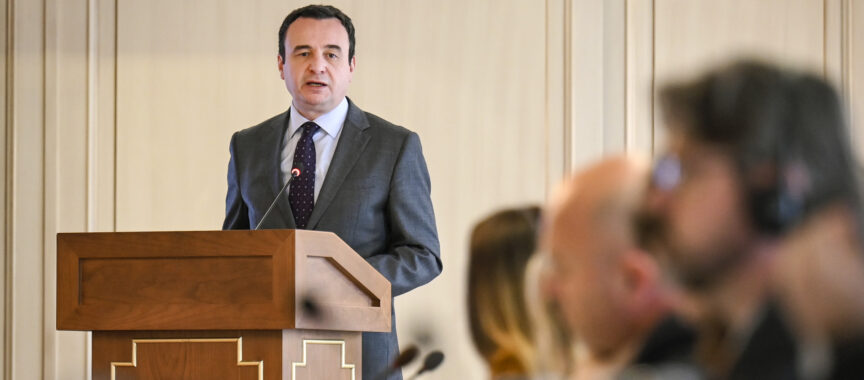Pristina, April 14, 2023
The Prime Minister of the Republic of Kosovo, Albin Kurti, participated in the round table with the topic “From policy to practice: Transforming Education through Digital Learning”, organized by the Ministry of Education, Science, Technology and Innovation in cooperation with the UNICEF Office in Kosovo and the European Union.
In his speech to the audience, Prime Minister Kurti said that if we were to single out one sector, which has a fundamental role in the socio-economic development of our country and which enables progress in all other sectors, it is undoubtedly education.
With the approval of the new Education Strategy 2022-2026, for the first time digitization in education is considered one of the five pillars of this ambitious strategy, to which 52 million euros have been dedicated and which ensures a comprehensive approach to digitization in education and addressing of all aspects of this transformation.
To improve access to digital learning, schools need Internet connectivity as well as electronic devices for both teachers and students. Prime Minister Kurti underlined that through the project for Kosovo’s Digital Economy (KODE), the government with the support of World Bank funds has reached 100%. So all settlements in Kosovo, including those in deep rural areas, have access to broadband internet. In the framework of the same project, 107 schools have been connected to broadband internet. However, 16% of schools still remain unconnected and of those that are already connected, only 49% have fiber optic connections.
He said schools need electronic equipment: computers, smart boards and printers. Figures from 2021 show that Kosovo’s public schools have an average of 1 computer per 35 students, which is far behind the European Union average. Therefore, considering that this is one of the priority areas where intervention should be done, the Prime Minister recalled that we have dedicated a government budget of 18 million euros for a 3-year period that will largely serve to finance the purchase of digital equipment for schools. This year, we have already received requests for the supply of digital equipment from 432 schools, which are currently being reviewed.
On our way to digital transformation, he said, a continuous assessment of the needs and demands of stakeholders is necessary. The digital learning needs assessment, conducted by the Institute of Psychology of the University of Pristina and supported by UNICEF, provides significant insights for the implementation of our education strategy, he said. Therefore, “we are happy to see that the findings of the research validate many of the activities foreseen in the action plan of the strategy, but also provide recommendations, which can further improve the effectiveness of the planned actions”, he said.
Prime Minister Kurti invited all our development partners for cooperation and support in implementing the digitization of education in our country.
Prime Minister Kurti’s full speech:
Honorable Minister of Education, Science, Technology and Innovation, Mrs. Arbërie Nagavci,
Honorable Ministers and Deputy Ministers,
Honorable United Nations Development Coordinator, Mrs. Arnhild Spence,
Honorable head of the UNICEF office in Kosovo, Mrs. Nona Zicherman,
Honorable Deputy Head of Cooperation Section of the EU in Kosovo, Mr. Alessandro Biancardi,
Honorable other representatives from the government, the institutions of our Republic, from academia, civil society and the private sector
Honorable participants,
Ladies and gentleman
Every area of government and every sector of the economy is important and so is digitization in each of those areas and sectors. But, if we were to single out one sector, which has a fundamental role in the socio-economic development of our country and which enables progress in all other sectors, it is undoubtedly education.
At the end of last year we approved the new Education Strategy 2022-2026. For the first time, digitalization in education is considered one of the five pillars of this ambitious strategy. 52 million euros have been dedicated to this pillar, which is 16% of the overall budget of the strategy. This ensures a comprehensive approach to digitization in education and addressing all aspects of this transformation.
The first important aspect in the pillar of digitization in education is the systems, processes and data in the field of education. Analytical data and related systems will ensure transparency and accountability and evidence-based policy making in the field of education. Whereas, automated processes will enable higher efficiency and productivity in the operation of the educational system. The comprehensive and centralized digital platform that will integrate these together will result in the overall improvement of the quality of educational services.
The second aspect addressed in the strategy is digital learning materials. When schools had to close due to the COVID-19 pandemic, video learning materials were a very important tool to support distance learning. But in the circumstances of normal learning in schools, multi-modal and much richer digital learning materials are needed, including audio-visual content, animations, interactive elements, virtual laboratories and educational games.
Digital learning materials offer limitless opportunities for students of the digital age to improve the quality and efficiency of learning, both at school and at home, and the strategy aims to make this opportunity available to all social categories in the country. Therefore, the action plan includes the preparation of digital teaching materials also in the languages of the communities, as well as for children with special needs.
To improve access to digital learning, schools need Internet connections, as well as electronic devices for both teachers and students. Here too, inclusiveness remains a key principle. Through the project for the Digital Economy of Kosovo (KODE), the government with the support of World Bank funds has achieved that 100%, i.e. all settlements in Kosovo, including those in deep rural areas, have access to broadband internet. In the framework of this project, 107 schools have been connected to broadband internet. However, 16% of schools still remain unconnected and of those that are already connected, only 49% have fiber optic connections. And in addition to connecting to the Internet, we must ensure that schools have their own LAN or WiFi networks, to distribute Internet access to all classrooms and school spaces.
And, of course, schools need electronic equipment: computers, smart boards and printers. Figures from 2021 show that Kosovo’s public schools have an average of 1 computer per 35 students, which is far behind the European Union average. Therefore, considering that this is one of the priority areas where we need to intervene, we have dedicated a government budget of 18 million euros for a 3-year period that will largely serve to finance the purchase of digital equipment for schools . This year, we have already received requests for the supply of digital equipment from 432 schools, which are currently being reviewed.
Digitization has the potential to revolutionize the way in which learning is delivered. With the use of technology, teachers can create and deliver learning units, assign and grade assignments, and communicate with students more efficiently. This can free up more time for them to focus on more critical aspects of teaching, such as providing individual support and input to students. However, to be able to use technology in the teaching process, teachers and other educational staff need new competences and skills.
This requires building our national frameworks based on the European Digital Competence Frameworks in order to ensure that teachers and other stakeholders have continuous access to training programs to achieve and maintain their digital skills.
And the last aspect, but not in terms of the importance of digital transformation in education, are the institutional mechanisms that will enable this transformation. Starting from the ministry level, up to the municipality and school level, organizational units and structures are needed to implement, manage and maintain digital technologies.
On our way to digital transformation, a continuous assessment of the needs and demands of stakeholders is necessary to ensure that the actions taken and those planned remain relevant and effective. The digital learning needs assessment, conducted by the Institute of Psychology of the University of Pristina and supported by UNICEF, provides significant insights for the implementation of our education strategy.
We are happy to see that the research findings validate many of the activities foreseen in the strategy action plan, but also provide recommendations, which can further improve the effectiveness of the planned actions.
I would like to thank the Ministry of Education, Science, Technology and Innovation for organizing this round table, as well as UNICEF and the Institute of Psychology of the University of Pristina, for preparing the case study and the needs assessment report for digital learning.
Also, I express my special appreciation to UNICEF for its continuous and unwavering support for strengthening our education system over the years.
In the end, let me take advantage of this opportunity to once again invite all our development partners for cooperation and support in the implementation of digitalization of education in our country.
Thank you.
Last modified: April 19, 2023


